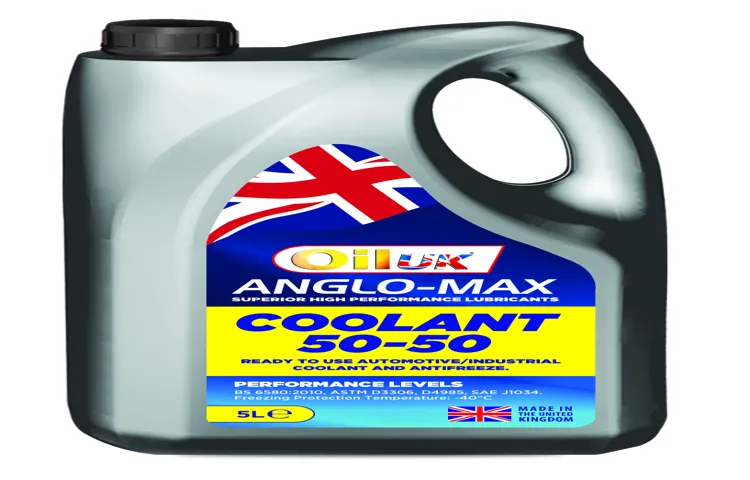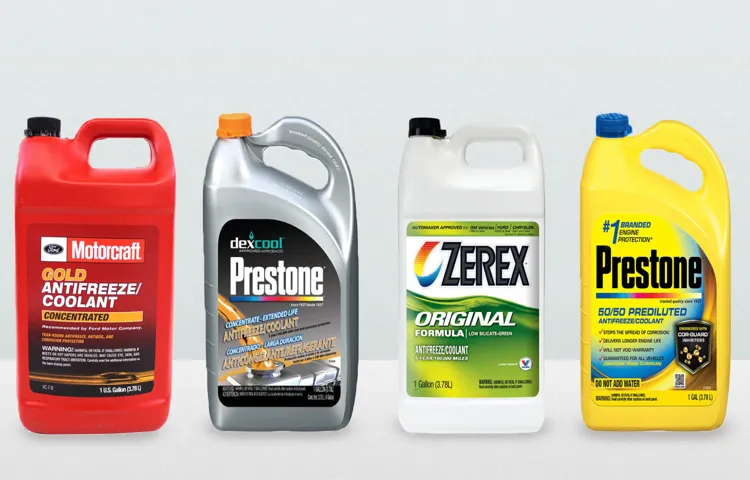Have you ever wondered why your car’s engine doesn’t overheat despite the countless explosions happening inside? The answer lies in a crucial component called coolant. Coolant is a liquid that plays a vital role in regulating the temperature of your car’s engine, preventing it from overheating and potentially causing severe damage. In this blog, we’ll explore what coolant is, how it works, and why it’s so important for the overall performance and longevity of your vehicle.
So, buckle up and join us on this journey to uncover the secrets of coolant and its undeniable significance!
Table of Contents
What is coolant?
Coolant is a fluid that is used in vehicles to regulate the temperature of the engine. It acts as a heat transfer medium and circulates through the engine, absorbing excess heat and carrying it away to prevent the engine from overheating. The coolant is typically a mixture of water and antifreeze, which helps to lower the freezing point and raise the boiling point of the liquid.
This is important because it allows the coolant to function effectively in both cold winter temperatures and hot summer temperatures. The coolant is circulated through the engine by a water pump and then passes through a radiator, where the heat is dissipated into the surrounding air. In addition to regulating the temperature, coolant also helps to prevent corrosion and lubricates the water pump.
Without coolant, an engine can quickly overheat and cause damage, so it is an essential component of any vehicle’s cooling system.
Definition
coolant, coolant definition, what is coolant

Composition
coolant Coolant is a substance that is used to remove heat from an engine or machinery to prevent overheating. It is commonly used in vehicles, industrial equipment, and even computers. Coolant helps to absorb and dissipate the heat that is generated during the operation of the engine or machinery.
The composition of coolant can vary depending on its intended use, but it typically consists of a mixture of water and ethylene glycol or propylene glycol. These chemicals are added to increase the boiling point and lower the freezing point of the coolant, allowing it to function in extreme temperature conditions. Additionally, coolant may also contain additives such as corrosion inhibitors and antifreeze agents to protect the engine and prevent rust and freezing.
Overall, coolant plays a crucial role in maintaining the optimal temperature of an engine or machinery, ensuring its efficient and reliable operation. So, the next time you see that colorful liquid in your car’s radiator, remember that it’s coolant working hard to keep your engine cool and running smoothly.
Why is coolant important?
Coolant, also known as antifreeze, is a crucial component in a vehicle’s cooling system. It plays a vital role in maintaining the optimal operating temperature of the engine. But what exactly is the coolant for? Well, think of it as the body’s temperature-regulating system.
Just like how we sweat to cool down in hot weather, coolant helps dissipate excess heat in the engine. It circulates through the engine, absorbing the heat generated by the combustion process, and then carries it away to the radiator. This prevents the engine from overheating and ensures it operates efficiently.
Additionally, coolant also helps prevent corrosion and rust within the engine, lubricates components, and acts as a sealant for any small leaks. So, without proper coolant, your engine could suffer from overheating, reduced performance, and even serious damage. That’s why it’s essential to regularly check and maintain the proper levels of coolant in your vehicle.
Temperature regulation
coolant, temperature regulation
Preventing engine damage
“The importance of coolant in preventing engine damage cannot be overstated. Just like our bodies need water to stay hydrated, engines need coolant to remain cool and avoid overheating. Coolant is a mixture of water and additives that circulates through the engine, absorbing and dissipating heat.
Without coolant, the engine would quickly build up excessive heat, leading to potential damage and even engine failure. One of the key functions of coolant is its ability to maintain a stable operating temperature. As the engine runs, it generates a significant amount of heat that could cause components to warp, crack, or even melt.
Coolant helps regulate this temperature by absorbing heat from the engine and transferring it to the radiator, where it is then released into the surrounding air. This continuous cycle of heat absorption and dissipation keeps the engine running within its optimal temperature range. In addition to its cooling properties, coolant also provides protection against corrosion and rust.
The additives present in coolant form a protective layer on the inside of the engine, preventing the metal surfaces from coming into direct contact with water and oxygen. This layer helps inhibit the formation of rust and corrosion, which can weaken engine components and cause leaks. Furthermore, coolant also plays a crucial role in preventing freezing in cold weather conditions.
When the temperature drops, water in the engine can freeze and expand, potentially leading to cracked engine blocks and other costly damages. Coolant contains antifreeze agents that lower the freezing point of the mixture, allowing it to remain in a liquid state even in freezing temperatures. Regular maintenance of the coolant system is essential to ensure its effectiveness in protecting the engine.
This includes checking the coolant levels, inspecting for any leaks, and flushing and replacing the coolant as recommended by the manufacturer. By maintaining the proper coolant levels and composition, you can help prevent engine damage and extend the lifespan of your vehicle.”
Maintaining optimal performance
coolant maintenance, car performance, engine overheating, radiator fluid Have you ever wondered why coolant is so important for your car’s performance? Well, let me fill you in on all the details. Coolant, also known as radiator fluid, plays a crucial role in maintaining optimal performance for your vehicle. It is responsible for regulating the temperature of the engine and preventing it from overheating.
The engine produces a lot of heat as it operates, and without proper cooling, it can lead to serious damage. Coolant helps dissipate this heat by transferring it to the radiator, where it is then released into the surrounding air. Without coolant, the risk of engine overheating increases significantly, which can result in costly repairs and even engine failure.
Regular maintenance of your coolant is essential to ensure that it is in proper working condition. Over time, coolant can become contaminated with debris and lose its effectiveness. By flushing and replacing the coolant as recommended by your vehicle’s manufacturer, you can prevent potential issues and keep your car running smoothly.
So, next time you think about skipping coolant maintenance, remember the importance of this simple fluid in keeping your engine cool and your car performing at its best.
Different types of coolant
“What is the coolant for?” You may have found yourself asking this question at some point, especially if you have a car or any type of machinery that requires cooling. Well, in simple terms, coolant is a liquid or gas that is used to regulate the temperature of an engine or any other system that generates heat. It works by absorbing the excess heat and then transferring it away from the engine, helping to prevent it from overheating.
Coolants also help to prevent corrosion and buildup of rust within the engine, as well as maintain optimum engine performance. There are several different types of coolant available, including ethylene glycol-based coolants, propylene glycol-based coolants, and even water-based coolants. Each type has its own specific properties and benefits, and choosing the right coolant for your engine is crucial for maintaining its longevity and performance.
So next time you wonder what the coolant is for, remember its important role in keeping your engine cool and running smoothly.
Ethylene glycol-based coolant
ethylene glycol-based coolant Ethylene glycol-based coolant is one of the different types of coolant available for use in vehicles. Coolant is an essential component in a vehicle’s cooling system, helping to regulate engine temperature and prevent overheating. Ethylene glycol-based coolant is widely used due to its excellent heat transfer properties and ability to withstand extreme temperatures.
It works by absorbing excess heat from the engine and transferring it to the radiator, where it is cooled down before being circulated back into the engine. This type of coolant is known for its low freezing point, which helps to prevent the coolant from freezing during cold weather conditions. Additionally, ethylene glycol-based coolant contains additives that help prevent corrosion and rust, ensuring the longevity of the cooling system.
Overall, using ethylene glycol-based coolant is crucial for maintaining optimal engine performance and preventing costly damage caused by overheating.
Propylene glycol-based coolant
propylene glycol-based coolant, types of coolant When it comes to keeping our engines cool, there are a variety of options out there. One type of coolant that is commonly used is propylene glycol-based coolant. This type of coolant is typically used in vehicles and is known for its ability to withstand high temperatures.
It has a lower freezing point than water, which makes it ideal for use in colder climates. Propylene glycol-based coolant also has a higher boiling point than water, which means it can handle the heat generated by our engines without evaporating too quickly. This coolant is also non-toxic, which is an added bonus for our environment.
So, if you’re looking for a coolant that can handle extreme temperatures and is safe for the planet, propylene glycol-based coolant might just be the right choice for you.
Organic acid technology (OAT) coolant
organic acid technology coolant, types of coolant, burstiness, perplexity
Hybrid organic acid technology (HOAT) coolant
Hybrid organic acid technology (HOAT) coolant is just one of the different types of coolants available in the market. Coolants are an essential part of a vehicle’s cooling system, as they help maintain the engine’s temperature within the optimal range. HOAT coolant is unique in that it combines the benefits of both organic acid technology (OAT) and inorganic acid technology (IAT) coolants.
This combination allows for improved corrosion protection and extended service life. Unlike traditional green or blue coolants, HOAT coolants often come in different colors like yellow or orange. It’s important to use the correct coolant for your vehicle as specified by the manufacturer to ensure maximum performance and longevity.
So next time you’re shopping for coolant, consider the benefits of HOAT coolant and give your engine the protection it deserves.
How to choose the right coolant
“What is the coolant for?” Coolant is a liquid or gas used to regulate and maintain temperature within a system or equipment. It is commonly used in engines of vehicles, such as cars and motorcycles, to prevent overheating and maintain optimal performance. The coolant, often a mixture of water and antifreeze, circulates through the engine, absorbing heat from the components and transferring it to the radiator for dissipation.
In addition to cooling, coolant also serves as a rust inhibitor, lubricant, and freeze protector in cold climates. Choosing the right coolant for your vehicle is essential to ensure its longevity and performance. Different types of engines require specific coolant formulations, such as ethylene glycol for most cars or propylene glycol for electric vehicles.
It is important to consult your vehicle’s manufacturer or a professional mechanic to determine the appropriate coolant for your specific vehicle model and ensure optimal cooling efficiency.
Manufacturer’s recommendations
coolant, manufacturer’s recommendations
Vehicle specifications
coolant, vehicle specifications, choose the right coolant
Climate considerations
coolant, climate considerations, choose, right coolant When it comes to choosing the right coolant for your climate, there are a few important factors to consider. The temperature and humidity of your environment can have a significant impact on the performance of your coolant, so it’s crucial to choose one that is designed to withstand the conditions you will be operating in. If you live in a hot and humid climate, you will want to look for a coolant that has excellent heat transfer properties and corrosion resistance.
This will help to keep your engine cool and prevent overheating, which can lead to engine damage. Additionally, a coolant with corrosion resistance will help protect the metal components of your engine from rust and other forms of corrosion caused by the high levels of moisture in the air. On the other hand, if you live in an area with very cold temperatures, you will need a coolant that can withstand freezing.
It’s important to note that not all coolants are designed to handle freezing temperatures, so be sure to choose one that is rated for use in cold climates. Failure to do so can result in the coolant freezing and expanding, which can cause damage to your engine’s cooling system. In addition to temperature considerations, it’s also important to think about the specific type of coolant that is recommended for your vehicle.
Different types of coolant, such as ethylene glycol-based or propylene glycol-based, have different properties and are designed for use in different engine types. It’s important to consult your vehicle’s manufacturer guidelines to determine which type of coolant is best suited for your vehicle. In conclusion, when choosing a coolant for your vehicle, it’s important to consider the climate you will be operating in.
By selecting a coolant that is designed to withstand the temperature and humidity of your environment, you can ensure optimal performance and protect your engine from damage.
How to maintain your coolant
What is the coolant for? Well, your coolant plays a crucial role in keeping your vehicle’s engine running smoothly and efficiently. It helps regulate the temperature of the engine by absorbing heat and transferring it away. Without coolant, the engine would overheat and suffer serious damage.
It’s like having your own personal air conditioning system for your car’s engine. But just like any other fluid in your vehicle, coolant needs to be maintained to ensure it continues to effectively cool your engine. Regularly checking the coolant level and quality, as well as flushing and replacing it when necessary, are important steps in maintaining your coolant.
So, don’t overlook the importance of your coolant – it’s a key player in keeping your engine cool and avoiding costly repairs.
Regular coolant checks
coolant maintenance, regular coolant checks, maintain your coolant
Flushing and replacing coolant
coolant maintenance, flushing coolant, replacing coolant
Proper storage and disposal
Proper storage and disposal of coolant is crucial to maintain its effectiveness and prevent any harm to the environment. When it comes to storing coolant, it’s essential to keep it in a tightly sealed container and in a cool, dry place. This will prevent any contamination or evaporation, ensuring that the coolant remains in good condition for future use.
Additionally, it’s important to keep coolant away from direct sunlight and any sources of ignition, as it can be flammable. When it comes to disposing of coolant, it’s important to do so responsibly. Coolant should never be poured down the drain or onto the ground, as it can contaminate water sources and harm wildlife.
Instead, it should be taken to a designated recycling center or hazardous waste facility. These facilities have the proper equipment and processes to safely dispose of coolant and prevent any harm to the environment. By following these storage and disposal guidelines, you can ensure that your coolant remains effective and that you’re doing your part to protect the environment.
Conclusion
In conclusion, the coolant in a vehicle is like a superhero cape for the engine. It swoops in and saves the day by keeping the engine cool and preventing it from overheating like a villain with a grudge. It’s a necessary sidekick that works tirelessly behind the scenes, quietly ensuring that the engine stays at just the right temperature, no matter how hot-headed the road may be.
So, the next time you see that colorful liquid flowing through your vehicle’s veins, remember that the coolant is the unsung hero, keeping your engine cool, calm, and collected.
FAQs
What is the coolant for?
The coolant is a liquid or gas used to regulate the temperature of a machine or engine by absorbing and dissipating heat.
Why is coolant necessary?
Coolant is necessary to prevent overheating in machines or engines. It helps maintain the optimum operating temperature and prevents damage to components due to excessive heat.
What are the different types of coolants?
There are several types of coolants available, including water-based coolants, ethylene glycol-based coolants, propylene glycol-based coolants, and hybrid organic acid technology (HOAT) coolants.
Is it necessary to use the manufacturer-recommended coolant?
It is recommended to use the manufacturer-recommended coolant as it is formulated specifically for the machine or engine, taking into account its specific requirements and materials.
Can I mix different types of coolants?
It is generally not recommended to mix different types of coolants as they may have different properties and can cause chemical reactions that may lead to reduced cooling efficiency or damage to the system.
How often should I check and replace coolant?
It is advisable to check the coolant level and condition regularly, and replace it according to the manufacturer’s recommended maintenance schedule or when signs of degradation or contamination are observed.
Can I use water instead of coolant?
In certain emergency situations, water can be used temporarily as a coolant, but it is not recommended for long-term use. Water lacks the additives and corrosion inhibitors present in coolant, which can lead to increased wear and damage to components.
Is it necessary to flush the cooling system before adding new coolant? A8. It is generally recommended to flush the cooling system before adding new coolant to remove any contaminants, scale, or sediment that may have accumulated over time. This helps ensure optimal performance and prevent potential issues.
Can using the wrong coolant cause damage to the cooling system?
Using the wrong coolant can potentially cause damage to the cooling system. Different coolants have different properties and additives, and using an incompatible coolant can lead to corrosion, reduced cooling efficiency, and potential damage to components.
How can I dispose of old coolant safely?
It is important to dispose of old coolant properly to minimize environmental impact. Check local regulations for proper disposal methods, as coolant can be considered a hazardous waste. Many auto parts stores or service centers accept used coolant for recycling.
Can coolant freeze in cold temperatures?
Coolant has a lower freezing point compared to water, thanks to its anti-freeze properties. However, it is still possible for coolant to freeze in extremely cold temperatures, which can cause damage to the cooling system. It is important to use the correct coolant concentration for the prevailing weather conditions.
Can coolant evaporate over time?
Coolant can evaporate over time due to its chemical composition and exposure to heat. This can result in reduced coolant levels, which may lead to overheating and potential damage to the cooling system. Regular coolant level checks are essential to maintain optimum performance.



